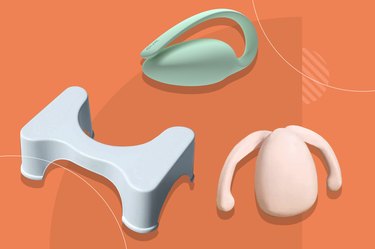
When you think of pelvic floor therapy, you may think of Kegel exercises — which are basically a workout for your pelvic floor muscles — but there's a lot more to it than that.
Pelvic floor therapy is a type of physical therapy that aims to restore the function of your pelvic floor, a group of muscles that help control your bowel, bladder, sexual and postural function, says Heather Jeffcoat, DPT, a Los Angeles-based physical therapist.
Video of the Day
Video of the Day
When these muscles aren't functioning properly (aka, pelvic floor dysfunction), a variety of symptoms can get in the way of your day-to-day activities.
We spoke to pelvic floor physical therapists about the signs and symptoms of pelvic floor dysfunction to look out for. If you experience any of these, it might be time to see a pelvic floor specialist.
1. Leakage When You Laugh, Cough or Sneeze
One of the pelvic floor's many roles is to support the bladder. When it's able to do its job properly, it prevents urinary leakage.
But experiencing urinary incontinence (aka, peeing a little) when you laugh, sneeze, cough or jump could be a sign of pelvic floor weakness.
In fact, a weakened pelvic floor is the most common reason for urinary or stress incontinence, according to the National Association for Continence.
"In pelvic floor physical therapy, we address the mobility and strength of your pelvic floor muscles and how fast they can react to quick movements like jumping or laughing," says Jessica Chellsen, DPT, a doctor of physical therapy and pelvic floor rehabilitation specialist with a private practice in San Luis Obispo, California.
Jeffcoat adds that you shouldn't ignore any amount of urinary leakage — even if it's just a few drops at a time.
"This often gets dismissed as a normal consequence of pregnancy and aging, but pelvic floor physical therapy can make significant improvements or even eliminate this symptom so you're not sentenced to a lifetime of incontinence pads," she says.
2. Painful Intercourse
Talking about sex is often taboo, but if you have pain or discomfort during intercourse, your physical therapist wants to know about it. And they may be able to help.
"Painful sex is all too often dismissed as a woman's anxiety or fear around penetration," Jeffcoat says, adding that there may be an underlying medical cause.
Vaginismus is a common diagnosis for painful sex. It occurs when the vagina tenses involuntarily, which also makes it difficult to insert a tampon or undergo a pelvic exam without discomfort or pain, per the Cleveland Clinic.
Tight pelvic floor muscles may also be an explanation for painful penetration, Chellsen says.
A pelvic floor therapist can teach you strategies to relax those tight muscles, such as breathing exercises and stretches. Manual therapy can also help relieve pelvic floor tension.
3. Frequent Trips to the Bathroom
One of the most common symptoms of pelvic floor dysfunction is frequent urination. Your pelvic floor muscles support your bladder, so it's no wonder that dysfunction in these muscles can show up as urination issues.
The urge to pee may be so strong that you might fail to make it to the bathroom in time.
This can feel as though you have a small bladder or drank too much water, but even if you're well hydrated, you shouldn't visit the bathroom more than every two to four hours during the day, says Kari Hough, DPT, a doctor of physical therapy with a private practice in Ellicott City, Maryland.
"Pelvic floor physical therapy can teach you to retrain your bladder and pelvic floor muscles through a variety of techniques," Hough says.
Some of her recommended techniques include keeping a bladder diary and performing pelvic floor exercises.
4. Aches and Pains During and After Pregnancy
Many people learn about pelvic floor therapy after they've given birth, but Hough wants you to know that it can help with symptoms during pregnancy, too.
"Women can suffer from all types of aches and pains during pregnancy, and there's so much pelvic floor physical therapy can do to help alleviate their discomfort," she says.
During pregnancy, pelvic floor therapy may help with back pain, hip pain, urinary concerns and other symptoms. It can also reduce the likelihood of vaginal tearing, urinary incontinence and pelvic organ prolapse (POP), per an April 2021 review in Medicina.
Pelvic floor physical therapists can offer services like perineal massage, pelvic floor preparation, pushing techniques and labor and delivery positions to help improve outcomes, Hough adds.
Hough encourages pregnant people to continue pelvic floor therapy after giving birth, especially if symptoms like weak stomach and pelvic floor muscles are present.
"It can help restore pelvic floor muscle function commonly strained during birth," she explains. "It's important to remember that the female body undergoes a lot of stress during pregnancy and childbirth, and it can take months of rehabilitation to fully recover."
5. Pelvic Pain, Heaviness or Bulging
Pelvic pain is a good reason to see a pelvic floor specialist, especially if it becomes chronic and interferes with your daily life. While medicine and surgery are possible treatment options, so is physical therapy, notes the Cleveland Clinic.
There are several causes of pelvic pain, Jeffcoat says, including endometriosis. Chronic pelvic pain is often dismissed as a problem of the uterus, she says, but those with endometriosis experience pain daily. "Endometriosis should be treated as a chronic pain condition and physical therapists that manage chronic pain should always be involved," Jeffcoat says.
Unusual sensations around the pelvic region can also be a sign of pelvic organ prolapse (POP), Chellsen adds. She says symptoms like pelvic heaviness or bulging could be early indicators.
"POP is when one or more of your pelvic organs (bladder, bowels or uterus) move down from their typical position and bulge into the vaginal wall," Chellsen explains.
Kegel exercises can improve POP symptoms, but doing them incorrectly can make matters worse, per the American College of Obstetricians and Gynecologists. Instead of trying to resolve these symptoms on your own, a pelvic floor physical therapist can guide you.
6. Fecal Incontinence or Constipation
Like urinary incontinence, fecal incontinence is a symptom of pelvic floor dysfunction and a sign you need pelvic floor therapy. It's the inability to control your bowel movements, causing the accidental leakage of stool.
Pelvic floor muscle training can strengthen the anal sphincter muscles as part of treating fecal incontinence, per an October 2020 review in the Journal of Clinical Medicine.
Similarly, if you're not having normal bowel movements, that could be a sign of a pelvic floor problem. ("Normal" can differ for everyone, but constipation is defined by fewer than three bowel movements per week and/or difficulty passing stools, per the National Institute of Diabetes and Digestive and Kidney Diseases.)
In her experience, Hough says people report feeling they can't fully empty their bowels or have pebble-like stools.
"The pelvic floor muscles could play a role in the difficulty of passing stools," Hough says. "When those muscles are tense, it can cause difficulty with elimination."
That's where pelvic floor therapy comes in. It can help encourage relaxation to alleviate bowel symptoms like constipation.
How to Find a Pelvic Floor Physical Therapist
Think you might benefit from pelvic floor therapy but aren't sure where to start? Search one of these comprehensive online directories for a pelvic floor PT near you:
- National Association for Continence: "Why Do I Pee When I Cough?"
- Cleveland Clinic: "Vaginismus"
- Mayo Clinic: “Overactive Bladder”
- Medicina: "Pelvic-Floor Dysfunction Prevention in Prepartum and Postpartum Periods"
- Cleveland Clinic: “Pelvic Pain”
- The American College of Obstetricians and Gynecologists: “5 Things I Wish All Women Knew About Pelvic Organ Prolapse”
- Journal of Clinical Medicine: "Physiotherapy for Prevention and Treatment of Fecal Incontinence in Women—Systematic Review of Methods"
- National Institute of Diabetes and Digestive and Kidney Diseases: "Constipation"
Is this an emergency? If you are experiencing serious medical symptoms, please see the National Library of Medicine’s list of signs you need emergency medical attention or call 911.


